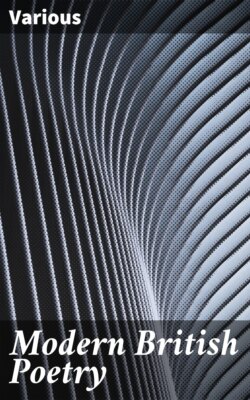Читать книгу Modern British Poetry - Various - Страница 6
На сайте Литреса книга снята с продажи.
the rise and decline of the æsthetic philosophy
ОглавлениеTable of Contents
The Yellow Book, the organ of a group of young writers and artists, appeared (1894–97), representing a reasoned and intellectual reaction, mainly suggested and influenced by the French. The group of contributors was a peculiarly mixed one with only one thing in common. And that was a conscious effort to repudiate the sugary airs and prim romantics of the Victorian Era.
Almost the first act of the "new" men was to rouse and outrage their immediate predecessors. This end-of-the-century desire to shock, which was so strong and natural an impulse, still has a place of its own—especially as an antidote, a harsh corrective. Mid-Victorian propriety and self-satisfaction crumbled under the swift and energetic audacities of the sensational younger authors and artists; the old walls fell; the public, once so apathetic to belles lettres, was more than attentive to every phase of literary experimentation. The last decade of the nineteenth century was so tolerant of novelty in art and ideas, that it would seem, says Holbrook Jackson in his penetrative summary, The Eighteen-Nineties, "as though the declining century wished to make amends for several decades of artistic monotony. It may indeed be something more than a coincidence that placed this decade at the close of a century, and fin de siècle may have been at once a swan song and a death-bed repentance."
But later on, the movement (if such it may be called), surfeited with its own excesses, fell into the mere poses of revolt; it degenerated into a half-hearted defense of artificialities.
It scarcely needed W. S. Gilbert (in Patience) or Robert Hichens (in The Green Carnation) to satirize its distorted attitudinizing. It strained itself to death; it became its own burlesque of the bizarre, an extravaganza of extravagance. "The period" (I am again quoting Holbrook Jackson) "was as certainly a period of decadence as it was a period of renaissance. The decadence was to be seen in a perverse and finicking glorification of the fine arts and mere artistic virtuosity on the one hand, and a militant commercial movement on the other. … The eroticism which became so prevalent in the verse of many of the younger poets was minor because it was little more than a pose—not because it was erotic. … It was a passing mood which gave the poetry of the hour a hothouse fragrance; a perfume faint yet unmistakable and strange."
But most of the elegant and disillusioned young men overshot their mark. Mere health reasserted itself; an inherent repressed vitality sought new channels. Arthur Symons deserted his hectic Muse, Richard Le Gallienne abandoned his preciosity, and the group began to disintegrate. The æsthetic philosophy was wearing thin; it had already begun to fray and reveal its essential shabbiness. Wilde himself possessed the three things which he said the English would never forgive—youth, power and enthusiasm. But in trying to make an exclusive cult of beauty, Wilde had also tried to make it evade actuality; he urged that art should not, in any sense, be a part of life but an escape from it. "The proper school to learn art in is not Life—but Art." And in the same essay ("The Decay of Lying") he wrote, "All bad Art comes from returning to Life and Nature, and elevating them into ideals." Elsewhere he said, "The first duty in life is to be as artificial as possible. What the second duty is no one has discovered."
Such a cynical and decadent philosophy could not go unchallenged. Its aristocratic blue-bloodedness was bound to arouse the red blood of common reality. This negative attitude received its answer in the work of that yea-sayer, W. E. Henley.
